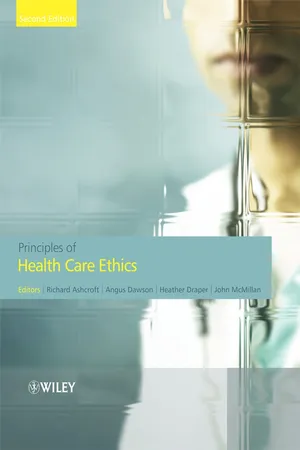
Principles of Health Care Ethics
- English
- ePUB (mobile friendly)
- Available on iOS & Android
Principles of Health Care Ethics
About this book
With a distinguished international panel of contributors working at the leading edge of academia, this volume presents a comprehensive guide to the field, with state of the art introductions to the wide range of topics in modern healthcare ethics, from consent to human rights, from utilitarianism to feminism, from the doctor-patient relationship to xenotransplantation.
This volume is the Second Edition of the highly successful work edited by Professor Raanan Gillon, Emeritus Professor of Medical Ethics at Imperial College London and former editor of the Journal of Medical Ethics, the leading journal in this field.
Developments from the First Edition include: The focus on 'Four Principles Method' is relaxed to cover more different methods in health care ethics. More material on new medical technologies is included, the coverage of issues on the doctor/patient relationship is expanded, and material on ethics and public health is brought together into a new section.
Frequently asked questions
- Essential is ideal for learners and professionals who enjoy exploring a wide range of subjects. Access the Essential Library with 800,000+ trusted titles and best-sellers across business, personal growth, and the humanities. Includes unlimited reading time and Standard Read Aloud voice.
- Complete: Perfect for advanced learners and researchers needing full, unrestricted access. Unlock 1.4M+ books across hundreds of subjects, including academic and specialized titles. The Complete Plan also includes advanced features like Premium Read Aloud and Research Assistant.
Please note we cannot support devices running on iOS 13 and Android 7 or earlier. Learn more about using the app.
Information
PART I
METHODOLOGY AND PERSPECTIVES
SECTION ONE: MORAL THEORY AND HEALTH CARE ETHICS
SECTION TWO: THEOLOGICAL APPROACHES TO HEALTH CARE ETHICS
SECTION THREE: METHODOLOGY AND HEALTH CARE ETHICS
1
The ‘Four Principles’ Approach to Health Care Ethics
THE ORIGINS OF PRINCIPLES IN HEALTH CARE ETHICS
THE FRAMEWORK OF PRINCIPLES
Table of contents
- Cover
- Table of Contents
- Title
- Copyright
- Contributors
- Foreword: Raanan E. Gillon
- Foreword: Tony Hope
- Preface
- PART I: METHODOLOGY AND PERSPECTIVES
- PART II: ISSUES IN HEALTH CARE PRACTICE
- PART III: MEDICINE IN SOCIETY
- Part IV: RESEARCH ETHICS AND ETHICS OF NEW TECHNOLOGIES
- Index
- End User License Agreement